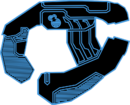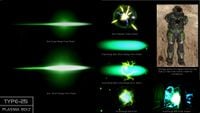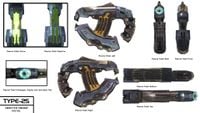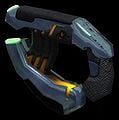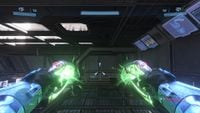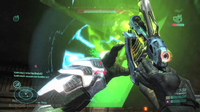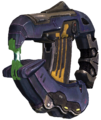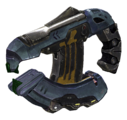Eos'Mak-pattern plasma pistol
From Halopedia, the Halo wiki
Template:Ratings Template:Weapon
- "The Type-25 DEP is the bread and butter of Covenant small arms — almost as common as the MA5 is with the UNSC. After the Covenant Carrier jumped there were some areas of Mombasa where plasma pistols covered the ground like leaves—that maneuver killed a bunch of dudes on both sides."
- — Unnamed UNSC Serviceman
The Type-25 Directed Energy Pistol[1], also known as the Plasma Pistol, is a Covenant infantry firearm, carried commonly by the smaller species, such as the Unggoy, Kig-yar, and the Yanme'e, as well as occasional sidearms for larger species' such as the Sangheili and Jiralhanae.
Design Details
The Plasma Pistol is a Covenant Directed Energy Weapon reverse engineered from forerunner technology that uses a superheated ionized gas called Plasma instead of projectile ammunition. The weapon is powered by a battery cell and has a power output of 100-150 KV @ 2~3 dA, but when overcharged, the power output is 1.5 MV @ 2~3 dA.[1] The Type-25 DEP is a semi-automatic weapon using a single collimator design that gives the weapon its smooth and aerodynamic, claw like appearance. The Type-25 DEPs functionality is straight forward, the rear section of the pistol has a holographic display which indicates temperature as the weapon is fired — in the center of the holographic display is a small red pad, this pad is the Type-25 DEPs safety and activation mechanism. Before the plasma pistol can be fired the user must place his thumb on the pad, the pistol then activates and can be fired. On the left side is another small red button this opens the top heating vent and allows access to the internal components of the Type-25 DEP. The Type-25 DEP is a standard-issue for lower-ranking Covenant infantry such Unggoy, Kig-Yar and Yamne'e[2], but is occasionally used by higher ranking species within the Covenant such as Ossoona Elites[3]; as such, it is the most commonly encountered Covenant energy weapon.[2]
Against infantry, the lethality of the Type-25 Directed Energy Pistol is extreme. Injuries inflicted to a victim are severe third-degree burns, this level of injury causes the wound to be cauterized instantly upon impact.[4] Body fluids would be subjected to flash vaporization, inducing a strain or a shock on the body after impact[5], fluids trapped in organs or arteries in addition to the rapid expansion of heat would cause ruptures or small explosions causing additional damage to the target. Near misses can also cause injury to the target, as they produce severe burns to the area they pass, this can also cause heat trauma or heat stroke from the extreme temperatures of the bolt.[6][7] Should the plasma impact an object, the impact can cause splash damage creating debris both non-heated and heated that may come into contact with a target, with a crippling or lethal effect.[8] Generally two hits from either a Plasma Pistol or Plasma Rifle will kill a light or unarmored target. The Type-25 Pistol also has the ability to charge a single superheated bolt, which can instantly deplete almost any form of energy shielding[9] and disable vehicle mechanics temporarily, and if an overcharged bolt were to hit an unarmored flesh target, it will result in an instant kill.[10] This high-powered shot makes the Plasma Pistol a formidable strategic weapon, however like its counterpart, over-extended periods of fire will overheat the weapon. In the context of the Halo games, all of the plasma weapons' strength and lethality are compensated for both the sake of ESRB rating and gameplay.
Advantages
The Plasma Pistol is a great close-to medium range weapon, and as such can't inflict high damage at long range. The Plasma Pistol can also be used at long range if the user fires slowly and aims carefully by leading the target. The Plasma Pistol is extremely efficient at killing "soft" targets, while dealing large amounts of damage to a heavily armored target. Its overcharge ability is extremely dangerous to shielded infantry, and to non-shielded infantry. Because of the extreme temperatures released, a vehicle running on a hydrogen engine, or one that is lightly covered, can be damaged or disabled if the overcharged bolt hits it — in addition to the high temperatures, the electromagnetic bottle containing the plasma can produce an EMP which can disable any electronic device within range. When compared to the Plasma Rifle, the Plasma Pistol's non-overcharged firing mode is far more accurate at medium and long ranges, although the plasma projectiles tend to arc downward at long range. SPARTAN-IIs, SPARTAN-IIIs and Elites have the ability to dual-wield Plasma Pistols, doubling their efficiency in close- to mid-range combat situations. If fired fast enough, the high velocity of the plasma projectile coupled with the force of the kinetic impact, can knock over, or stun infantry.
Disadvantages
The Plasma Pistol, when fired continuously, or when an overcharged bolt is fired, will overheat because of the rapid cycling, loading, ignition, and release sequence of energy. To prevent the weapon from being damaged, the Type-25 DEP temporarily shuts down and opens a cooling vent to allow the excess heat to dissipate before the weapon reactivates. This process leaves the weapon temporarily inoperable. Infantry who are not aware of the function of the Plasma Pistol can get killed because of this. Human military experts and scientists do not understand how Covenant plasma weapons work, or how they are recharged; as such when the battery is depleted the Plasma Pistol must be discarded or replaced. At 10% charge level the Plasma Pistol will begin to misfire, this is due to the battery's inability to deliver enough energy to start and complete the ignition and release phase of operation. As such this hampers the operators use of the weapon. Continuously holding down the trigger while in overcharge mode will rapidly deplete the energy source, and if not careful the weapon can be wasted before firing a single round. Another disadvantage is its short range which is about 10-25 meters depending on the charge level.
Although the the Plasma Pistol can strike a target at long ranges, it is not suited for long-range combat, due to two distinct properties of the weapon's operation. The first is the rate of thermal expansion which is determined by the rate of the bloom of the bolt, blooming is the result of plasma breakdown in the air at energy densities of around a megajoule per cubic centimeter. This effect causes the plasma to defocus and disperse energy into the atmosphere. It can be more severe if there is fog, smoke, or dust in the air. As the bolt is accelerated away from the "barrel" of the weapon the plasma begins to decay as a result of the weakening magnetic field. Speed also factors in to this, the faster the bolt is accelerated, the farther the bolt will travel before the temperature of plasma begins to decay and the magnetic field becomes unstable and finally dissipates. As the bolt loses velocity it also loses kinetic damage as it travels longer distances.
Influences
The Plasma Pistol was inspired by the human "Zeus-Class Fusion Pistol" from the Marathon (Video Game Series). Like the Fusion Pistol, the Plasma Pistol is a reasonable-damage single-shot weapon with an overcharge mode. However, the Fusion Pistol's overcharge was far more deadly in-game and could kill nearly any enemy in the game, with one limitation: if the gun was left overcharged for too long, it would explode violently, killing the wielder.
Changes
The Plasma Pistol makes its first appearance in Halo: Combat Evolved and is far more powerful and accurate than its Halo 2 and Halo 3 counterparts, the weapon holds a unique ability to stun opponents that are hit by high-velocity plasma projectiles, thus greatly reducing the opponent's mobility and allowing the user to easily hold the opponent in the weapon's firing arc. However, the drawback was that this effect is only felt with continuous fire. While stunned, the weapon will often overheat before the opponent is killed. Despite this drawback, the stun ability is a useful and potent feature in the hands of an experienced user. In Campaign, the Plasma Pistol is best used against Sentinels and Elites, as the overcharge feature will quickly deplete the energy shield of the Elite, or destroy the Sentinel. The tracking abilities of the overcharged shots have varied as well. While they have a slight homing ability in Halo CE and Halo 3, they are extremely potent in Halo 2.
Changes from Halo: Combat Evolved to Halo 2
- Main articles: Halo: Combat Evolved, Halo 2
- The melee action has changed - instead of the Master Chief holding it in his left hand and punching with his right, he now holds it in his right and punches with his left.
- Overload shot contrail was removed.
- Rate of fire of standard shots are slower than the Halo: Combat Evolved counterpart.
- Overcharge charges up noticeably slower.
- Overcharge is slower but tracks much better.
- Overloads do not kick up as much dirt, dust, sparks and debris as the Halo: Combat Evolved counterpart.
- Overcharge bolt does no damage to unshielded biological targets.
- The plasma pistol can now be dual-wielded.
- Standard shots are noticeably weaker, smaller and more dull.
- Green electricity is present between the "prongs" of the Plasma Pistol.
- The color of the Plasma Pistol (blue) has darkened from Halo: Combat Evolved's version.
- The crosshairs of the reticule move closer together when the overload is locked-on to a target.
- The overcharge now takes 15% off instead of 10-11%.
- The plasma pistol now has only 200-300 shot before it runs out of ammo, instead of 500 it used to have.
Changes from Halo 2 to Halo 3 and Halo 3: ODST
- Main articles: Halo 3, Halo 3: ODST
- Maintaining an overcharge without releasing now decreases the battery rapidly (about 3% per second). Overcharges also drain 10% power in addition to the amount decreased when maintaining the charge.
- Takes slightly longer to cool down after overheating.
- If an overcharge impacts with a vehicle, the vehicle is temporarily disabled and has the same effect as the Power Drain.
- It takes a shorter time to charge an overcharge when holding down the trigger.
- It only homes in effectively at short range, rarely does it seek out enemies as effectively as in Halo 2 or Halo: CE. Otherwise it will just narrowly miss its target, completely miss, or not even seek its target in the first place.
- When wielded, if you look at the shadow of the Plasma Pistol, you can see a little "cap" on the posterior end, which is actually the overheating hologram.
- The overcharged shot resembles the one from Halo: CE, as it has a longer contrail than the Halo 2 overcharged shot, albeit much more detailed.
- The plasma pistol is marginally weaker than it was in Halo 2, often requiring 1 extra shot to kill most enemies compared to in Halo 2.
- The plasma pistol does the same amount of damage as the assault rifle against unshielded enemies; on Heroic difficulty, both the plasma pistol and assault rifle take 5 shots to kill a Minor Grunt, and 9 shots to kill a Major Grunt or Jackal.
- The plasma pistol now has 400 shots before it runs out of ammo.
- The plasma pistol is now purple instead of blue, it also appears to be smaller than in Halo 2.
Changes in Halo Wars
- Main article: Halo Wars
- Plasma Pistols do not drain shields instantly, even when overcharged.
- Unggoy now overcharge Plasma Pistols in-game.
- Jackals are not capable of using them.
- Sangheili are not capable of using them.
Changes from Halo 3 to Halo: Reach
- Main article: Halo: Reach
- The strength of the Plasma Pistol has been greatly increased. 7-10 shots is required to kill a fully-shielded SPARTAN.
- The plasma pistol has received a graphical overhaul with noticeable changes to its design. Its texture appears to be more crudely metallic than in any previous game. Some other changes includes a small raised section on the top, presumably an iron sight and a more defined grip on the lower section.
- Overcharge bolt tracking has been reduced.
- The overcharged bolt creates small area-of-effect damage.
- The plasma pistol's rate of fire is reduced to compensate for its higher power.
- Its battery now takes one full energy unit per shot in Multiplayer (five shots in Campaign and Firefight).
- The overcharged bolt not only disables shields, but will also damage around one third of a SPARTAN's health points.
- The overcharge will now drain 15% of the battery per shot (10% in Campaign and Firefight).
- The player will now occasionally melee with the pistol itself, instead of only using their fist.
- Grunts can now use its overcharged function in Campaign and Firefight.
Tactics
Campaign
- In the entire trilogy, the Plasma Pistol is most effective in close-quarters when facing Elites or Brutes, by first depleting their shield and then switching to a headshot-capable weapon. In Halo 3, ODST, this will also award you the EMP Medal and even the My Clothes! achievement.
- Going up against Elites in Halo: Combat Evolved, an effective up-close-and-personal strategy is to fire as fast as you can pull the trigger-- the shots will stun the Elite long enough for you to get up and melee him.
- In "Two Betrayals" the moment you begin switch to the Plasma Pistol and dodge behind the glass, charge up the Plasma Pistol and aim slightly ahead of where the Sentinel is heading, if timed just right you will take down all of them and still have enough ammo left to tackle the Elites in the Control Room's hallway.
- In Halo: Combat Evolved, the Plasma Pistol's semi-auto mode is as powerful as the Plasma Rifle and Assault Rifle when used against shields. However it does slightly less damage against flesh. Because it also has the overcharge feature, it's a good idea to drop those two weapons for the PP in most cases. This is, however, not an advisable tip in Halo 3 because of the increased power of the latter two weapons, and the drain on a Plasma Pistol's battery when overcharged.
Multiplayer
- In Halo: CE Multiplayer, the same strategy used against Elites also applies to your opponent in Multiplayer. Fire as fast as you can until you get in melee range.
- Using an overcharge can be effective against vehicles particularly if they are jumping or out of control, or headed your direction. This is a useful skill in Halo 3 as an overcharged shot can disable vehicles.
- The Plasma Pistol is quite useful for taking out Campers in maps such as Rat Race, where there are Covenant Shields, because it is capable of disabling shields temporarily, opening up the camper to shots from your team mates or use your secondary weapon if you are doing this alone.
- The Plasma Pistol has been synonymous for the Halo 2-coined term "Noob Combo". By equipping the Plasma Pistol with a headshot-capable weapon, using the Plasma Pistol to drain the enemy's shield and then finishing him off with the headshot-capable weapon can take out an opponent in seconds. It is most effective in Halo 2, though overpowered and overused. In Halo 3 it can still be accomplished, if at close range or close-quarters.
- In Halo 3, the Plasma Pistol is the best weapon to use when disabling vehicles when a Power Drain is not available, followed by a Plasma Grenade stick. However, impacting an overcharge with fast-moving vehicles will require a great deal of luck, timing and skill. A direct Plasma Grenade stick will be a better alternative. The Banshee will prove the most difficult because of its speed. The best tactic is to hide behind cover, luring the Banshee until it either attempts to splatter you or bomb you. However, note that Banshee pilots would be extra careful when they notice a green glow emitting from your weapon.
- Another common tactic is to use a charged shot to the head and follow it up with a melee attack.
- When on a team, have one player fire an overcharge at your enemy then have another finish them off when their shields are depleted and they're at their most vulnerable.
UNSC Remarks
- "The trigger is soft — no feedback — there’s no break that tells you when the overcharge is gonna kick in. First time I did it was by accident and it damn near sprained my wrist."
- "It’s a damned ray gun — how come we don’t have ray guns?"
- "It’s great in built-up areas and clearing buildings. Anything over a couple dozen meters though? Not so much."
- "How the foxtrot does it track anything? Whatever — I guess that’s why I carry an MA5 instead of a TACPAD."
- "It’s just the right size and it feels good in your hands, but give me a M7 or an MA5 any day of the week."
Trivia
- In Halo: Combat Evolved, if you remain idle while wielding a Plasma Pistol, Master Chief will pull off the top off the Pistol, showing what seems to be a power cell similar to a round of the Fuel Rod Gun. In Halo 3, the same will happen if you remain idle for a while; your character will flip it open and you will be able to see the internal mechanisms of the Pistol.
- When you swap a depleted Plasma Pistol for another weapon in Halo: Combat Evolved, the Pistol will disappear after falling to the ground.
- In Halo: Combat Evolved, the overcharged plasma bolt is capable of depriving any opponent of its shield. This ability may appear as quite bizarre on higher difficulties where an overcharged bolt can easily disable a Zealot's shield while even a stuck Plasma Grenade or a Rocket is not capable of achieving this. Therefore, it is wise to change to a Plasma Pistol when disabling shields instead of wasting otherwise more powerful and rarer weapons.
- In the PC version of Halo: Combat Evolved, if you have a MadCatz controller with a turbo button, you can fire the Plasma Pistol as fast as the second highest turbo setting, which is as fast as the Assault Rifle. However, it overheats extremely fast.
- In Halo 3, it is the only dual-wieldable weapon that does not cause less damage per shot when dual wielded than when single wielded. (26 head/body shots single- or dual-wielded to kill with normal shields; as compared to the M6G that takes 5 head or 8 body single-wielded but 7 head or 11 body when dual-wielded).
- In the Halo trilogy, if your Plasma Pistol is running low on battery, (less then 10%) when you fire it, then it will occasionally splutter and refuse to fire. This may be due to the fact that the power cell is unable to focus the remaining energy into a ball of plasma.
- Dadab and Linglin are the only named Grunts who utilized the overcharge mechanism of the Plasma Pistol.
- In Halo 3, if you look at your shadow whilst holding a Plasma Pistol, you may notice a "cap" like protrusion on the back of the gun. This is actually the hologram on the gun that indicates if it is overheated.
- In the "Another Day At The Beach" video from the Halo 2 Multiplayer Map Pack, Gunnery Sergeant Stacker uses a Plasma Pistol to take down the shields of an Elite before a member of his ODST squad uses a Battle Rifle to kill it, effectively using the Noob Combo.
- After killing the Prophet of Regret on "Regret" in Halo 2, he will drop a Plasma Pistol. This is because Regret carries the weapon as his sidearm.
- The Plasma Pistol is one of the only weapons in the trilogy in which the melee attack is a punch instead of the butt or any other part of the weapon, and has often been described as "fragile". However, players can melee with it in Halo: Reach with no ill effects.
- In Halo: Contact Harvest, Dadab notes that the Plasma Pistol's lowest power setting is an effective source of light, whilst he is leading a group of Grunts in the dark.
- In Halo 2 Vista, it is possible to instantly destroy a Ghost by aiming an overcharged bolt at the metal flaps on the back of the Ghost's wings.
- If you overcharge the Plasma Pistol in Halo 3 and slowly release the trigger, it will not fire a shot. The plasma would slowly dissipate and disappear. This can be used as a way to prevent excess battery depletion when an overcharge shot is fired. The Plasma Pistol in PC versions cannot do this as you are using a mouse to control the firing.
- The plasma bolts from the Plasma Pistol in Halo 3: ODST are somewhat smaller and less pronounced than the plasma bolts seen in Halo 3.
- In the Halo: Reach Multiplayer Beta, the sound effect for an overcharged blast was the same as when a circuit is hit in Marathon.
- In Halo 2, if you are carrying the Plasma Pistol and are in active camouflage, you may see a polygon near the front of the weapon; this however, is in active camo mode as well. This has only been witnessed on the PC version.
- In Halo 3, while in Active Camouflage, you can see a square where the heat monitor is. This indicates the hologram is a polygon.
- In the Extras section of the Halo 3 Strategy Guide, it is stated incorrectly that the Plasma Pistol has a clip size of 10/100. The Plasma Pistol does not have a clip size.
Sources
- ^ a b Bungie.net Plasma Pistol Article
- ^ a b Halo Encyclopedia page 320
- ^ Halo: The Flood page 28
- ^ Halo: The Fall of Reach pages 328
- ^ Halo: The Flood page 22
- ^ Halo: Ghosts of Onyx page 19
- ^ Halo: The Fall of Reach page 315
- ^ Halo: The Cole Protocol page 15
- ^ Halo: First Strike page 116
- ^ Halo: The Flood page 81
Gallery
- Plasma pistol.jpg
The Halo: Combat Evolved era plasma pistol.
- OverheatingPlasmaPistol.jpg
A plasma pistol overheating in Halo: Combat Evolved.
- Plasma Pistol Halo 3.jpg
The Halo 3 era plasma pistol.
- PlasmaPistol-Transparent.png
An in-game profile render of the Plasma Pistol from Halo 3.
